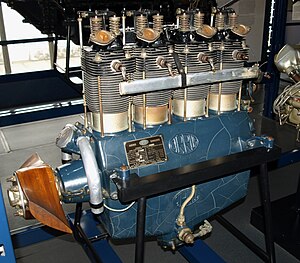Cirrus-Hermes IIB
| Cirrus | |
|---|---|
 |
|
| ADC Cirrus II at the Science Museum, London | |
| Type | Air-cooled 4-cylinder inline piston engine |
| National origin | United Kingdom |
| Manufacturer | Aircraft Disposal Company, Cirrus Aero-Engines Limited |
| First run | 1925 |
| Major applications |
de Havilland DH.60 Moth Avro Avian |
The ADC Cirrus and Cirrus-Hermes are British aero engines of the mid-1920s. Sometimes known as the Blackburn Cirrus, examples remain airworthy today.
ADC Cirrus engines were originally built by ADC Aircraft until Cirrus Aero Engines Limited was formed in 1927. The company became Cirrus-Hermes in 1931 when it was bought by the Cirrus-Hermes Engineering Company and later became the Cirrus Engine Section of Blackburn & General Aircraft Limited in 1934, and operated as a separate division until production ended in the post-World War II era.
Cirrus's first product was the 90 hp (67 kW) Cirrus I, which passed its 50-hour type rating in 1925. It was the first air-cooled inline engine, a design by Frank Halford that proved extremely popular for light aircraft. The basic layout (using one cylinder bank of an ADC Airdisco V-8 engine) was quickly copied by a number of other manufacturers. Later versions named the Cirrus II, and Cirrus III were produced each with slightly greater displacement, and power (Cirrus II - 85 hp, Cirrus III - 90 hp).
The next model line, Cirrus-Hermes I, II, and IV were produced ranging in power from 105 hp to 140 hp depending on type. The later Cirrus engines were designed to run inverted.
The Cirrus III was also produced/converted by American Cirrus Engines Inc., Belleville NJ (later A.C.E. Corp, Marysville MI.).
List from Lumsden.
Data from Lumsden.
Related development
Comparable engines
Related lists
...
Wikipedia
